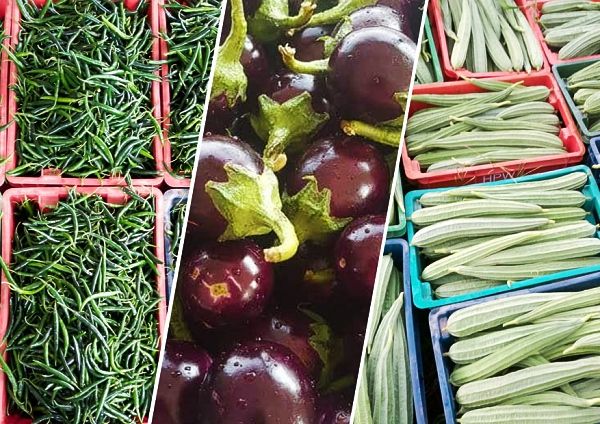The once lucrative business of harvesting vegetables for the export market is fast losing its lustre due to combination of factors, summarised in lack of investment and market uncertainty in the subsector.
The two key factors coupled with general dwindling export fortunes of the non-traditional exports from the country have negatively impacted the vegetable export business which used to provide a source of livelihood for thousands of people within the value chain and their dependents.
The situation became worse after the European Union (EU) ban between 2015 and 2017, robbed players in the business of their working capital, and forced majority of them to divert into other trades, including working as construction labourers, drivers' mates, head porters among others.
Checks by the GRAPHIC BUSINESS indicated that, of the registered 1,500 vegetable exporters in the country, only 100 exporters were currently in active business.
In a decade, data from the Ghana Export Promotion Authority (GEPA) has showed a negative export fluctuations in the sector.
From US$1.75 million in 2009, foreign exchange derived from vegetable exports rose to US$4.35 million in 2011, before declining to US$608,304 in 2016.
However, the industry, which yielded approximately US$831,751 in 2017 export earnings, dropped to US$669,208 in 2018.
One month ban
But nearly one and a half years into the resumption of vegetable exports, the country had place a temporary suspension on the export of capsicum (chillies), soladum (garden eggs), luffa (turia) and all leafy vegetables to the international market from June 1, 2019, sparking concerns as to the kind of measures implemented for the EU to reserve its ban.
According to the Plant Protection and Regulatory Services Directorate (PPRSD) of the Ministry of Food and Agriculture (MoFA), the external notifications it has been receiving from the EU and other international bodies about harmful organisms (insects: FCM larvae, franklella occidentalls-thrips and bactrocera cucurbitae) in Ghana's vegetables were become alarming.
Between January and May this year, internal interceptions of the harmful organisms in exportable vegetables alone have amounted to 120 while external notifications have reached 20.
The country recorded 149 external interceptions of the harmful organisms before the EU imposed the previous ban.
Measures
The Director of the PPRSD, Dr Felicia Ansah-Amprofi, said the suspension would be in place for one month to pave the way for an in-house cleaning to allow for a resumption in exports.
Among measures being put in place, she said, would consist of a progressive upgrade of the manual traceability system into a full electronic traceability system.
"Improvement of the overall inspection along the chain (from farm to pack house to the point of exit).
Assignment of two PPRSD staff to each member of 100 identified active vegetable exporters.
"The officers are to ensure close inspection and provide technical support from the point of production through pack houses to the points of exit," she said.
Wrong timing
In an interview with the paper on May 30, the Managing Director (MD) of a firm in the vegetable export business, AB Farms, Mr Abraham Agbesi, said the timing of the current export suspension was wrong because many of the producers and exporters were expected to harvest their produce between May and July this year.
"During this period, we harvest our produce every three days and so an export suspension simply means our produce are to go waste at the farm within this one month ban and giving the fact that we have invested heavily, our business is likely to collapse," he said.
According to him, the effect will not only affect himself but rather the over 80 outgrowers he had engaged for his 180 acre-vegetable farms located in Nsawam, Begoro, Akosombo, and Keta.
"One month suspension in export means, I will lose close to $40,000 of the loan secured from the bank, if those vegetables due for harvest remain in the farm for just two weeks," he said.
Collapsing businesses
The Vice-President of the Vegetable Producers and Exporters Association of Ghana (VEPEAG), Mr Felix Kamassah, said the export suspension would take the rest of the producers and exporters who survived the previous EU ban out of business and collapse the industry entirely.
He observed that the industry was gradually collapsing as majority of the producers and exporters were abandoning such a lucrative business to do menial jobs.
He said instead of a ban, the government could have dealt with the issue on case by case basis, as all exporters and their farm produce were already coded.
Mr Kamassah indicated that should producers and exporters survive what he described as surprising ban they would end up in destitution.
SDG challenges
The Sustainable Development Goal (SDG) goal one of the United Nations (UN), which seeks to end poverty in all forms by 2030, is greatly threatened by the periodic suspension of vegetable exports without consultations with stakeholders.
This is because a wrong timing of a ban on the vegetable export business has a rippling effect on the livelihood of thousands of people within the value chain and their dependents.
In addition, SDG goal 12, which seeks to encourage responsible consumption and production by 2030, seem unrealistic if the temporary export suspensions of vegetables continue without consultations.
National interest
In a direct response, the sector Minister, Dr Owusu Afriyie Akoto, said the government would rather prefer losing a small amount in foreign exchange than waiting and doing nothing in order for the EU to slap another ban for the country to lose about $20 million per year.
"We just came out of an EU ban, have anyone enquired about the amount of efforts and money invested for it to be reversed. So, we are not going to allow anybody to send the country back again because he or she have invested," he said.
Instead, he urged players in the industry to collaborate with the government to clean the system, as the national interest supersedes any other interest.
